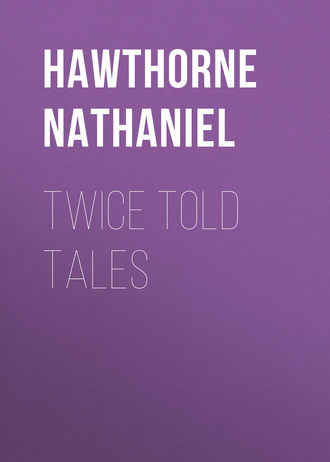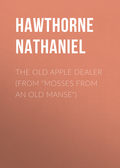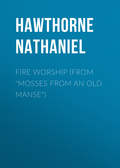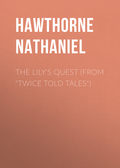
Натаниель Готорн
Twice Told Tales
Walter glanced sidelong at his mistress, and started. Motionless and absorbed, fascinated, as it were, in contemplation of Walter's portrait, Elinor's face had assumed precisely the expression of which he had just been complaining. Had she practised for whole hours before a mirror, she could not have caught the look so successfully. Had the picture itself been a mirror, it could not have thrown back her present aspect with stronger and more melancholy truth. She appeared quite unconscious of the dialogue between the artist and her lover.
"Elinor," exclaimed Walter, in amazement, "what change has come over you?"
She did not hear him nor desist from her fixed gaze till he seized her hand, and thus attracted her notice; then with a sudden tremor she looked from the picture to the face of the original.
"Do you see no change in your portrait?" asked she.
"In mine? None," replied Walter, examining it. "But let me see. Yes; there is a slight change – an improvement, I think, in the picture, though none in the likeness. It has a livelier expression than yesterday, as if some bright thought were flashing from the eyes and about to be uttered from the lips. Now that I have caught the look, it becomes very decided."
While he was intent on these observations Elinor turned to the painter. She regarded him with grief and awe, and felt that he repaid her with sympathy and commiseration, though wherefore she could but vaguely guess.
"That look!" whispered she, and shuddered. "How came it there?"
"Madam," said the painter, sadly, taking her hand and leading her apart, "in both these pictures I have painted what I saw. The artist – the true artist – must look beneath the exterior. It is his gift – his proudest, but often a melancholy one – to see the inmost soul, and by a power indefinable even to himself to make it glow or darken upon the canvas in glances that express the thought and sentiment of years. Would that I might convince myself of error in the present instance!"
They had now approached the table, on which were heads in chalk, hands almost as expressive as ordinary faces, ivied church-towers, thatched cottages, old thunder-stricken trees, Oriental and antique costume, and all such picturesque vagaries of an artist's idle moments. Turning them over with seeming carelessness, a crayon sketch of two figures was disclosed.
"If I have failed," continued he – "if your heart does not see itself reflected in your own portrait, if you have no secret cause to trust my delineation of the other – it is not yet too late to alter them. I might change the action of these figures too. But would it influence the event?" He directed her notice to the sketch.
A thrill ran through Elinor's frame; a shriek was upon her lips, but she stifled it with the self-command that becomes habitual to all who hide thoughts of fear and anguish within their bosoms. Turning from the table, she perceived that Walter had advanced near enough to have seen the sketch, though she could not determine whether it had caught his eye.
"We will not have the pictures altered," said she, hastily. "If mine is sad, I shall but look the gayer for the contrast."
"Be it so," answered the painter, bowing. "May your griefs be such fanciful ones that only your pictures may mourn for them! For your joys, may they be true and deep, and paint themselves upon this lovely face till it quite belie my art!"
After the marriage of Walter and Elinor the pictures formed the two most splendid ornaments of their abode. They hung side by side, separated by a narrow panel, appearing to eye each other constantly, yet always returning the gaze of the spectator. Travelled gentlemen who professed a knowledge of such subjects reckoned these among the most admirable specimens of modern portraiture, while common observers compared them with the originals, feature by feature, and were rapturous in praise of the likeness. But it was on a third class – neither travelled connoisseurs nor common observers, but people of natural sensibility – that the pictures wrought their strongest effect. Such persons might gaze carelessly at first, but, becoming interested, would return day after day and study these painted faces like the pages of a mystic volume. Walter Ludlow's portrait attracted their earliest notice. In the absence of himself and his bride they sometimes disputed as to the expression which the painter had intended to throw upon the features, all agreeing that there was a look of earnest import, though no two explained it alike. There was less diversity of opinion in regard to Elinor's picture. They differed, indeed, in their attempts to estimate the nature and depth of the gloom that dwelt upon her face, but agreed that it was gloom and alien from the natural temperament of their youthful friend. A certain fanciful person announced as the result of much scrutiny that both these pictures were parts of one design, and that the melancholy strength of feeling in Elinor's countenance bore reference to the more vivid emotion – or, as he termed it, the wild passion – in that of Walter. Though unskilled in the art, he even began a sketch in which the action of the two figures was to correspond with their mutual expression.
It was whispered among friends that day by day Elinor's face was assuming a deeper shade of pensiveness which threatened soon to render her too true a counterpart of her melancholy picture. Walter, on the other hand, instead of acquiring the vivid look which the painter had given him on the canvas, became reserved and downcast, with no outward flashes of emotion, however it might be smouldering within. In course of time Elinor hung a gorgeous curtain of purple silk wrought with flowers and fringed with heavy golden tassels before the pictures, under pretence that the dust would tarnish their hues or the light dim them. It was enough. Her visitors felt that the massive folds of the silk must never be withdrawn nor the portraits mentioned in her presence.
Time wore on, and the painter came again. He had been far enough to the north to see the silver cascade of the Crystal Hills, and to look over the vast round of cloud and forest from the summit of New England's loftiest mountain. But he did not profane that scene by the mockery of his art. He had also lain in a canoe on the bosom of Lake George, making his soul the mirror of its loveliness and grandeur till not a picture in the Vatican was more vivid than his recollection. He had gone with the Indian hunters to Niagara, and there, again, had flung his hopeless pencil down the precipice, feeling that he could as soon paint the roar as aught else that goes to make up the wondrous cataract. In truth, it was seldom his impulse to copy natural scenery except as a framework for the delineations of the human form and face, instinct with thought, passion or suffering. With store of such his adventurous ramble had enriched him. The stern dignity of Indian chiefs, the dusky loveliness of Indian girls, the domestic life of wigwams, the stealthy march, the battle beneath gloomy pine trees, the frontier fortress with its garrison, the anomaly of the old French partisan bred in courts, but grown gray in shaggy deserts, – such were the scenes and portraits that he had sketched. The glow of perilous moments, flashes of wild feeling, struggles of fierce power, love, hate, grief, frenzy – in a word, all the worn-out heart of the old earth – had been revealed to him under a new form. His portfolio was filled with graphic illustrations of the volume of his memory which genius would transmute into its own substance and imbue with immortality. He felt that the deep wisdom in his art which he had sought so far was found.
But amid stern or lovely nature, in the perils of the forest or its overwhelming peacefulness, still there had been two phantoms, the companions of his way. Like all other men around whom an engrossing purpose wreathes itself, he was insulated from the mass of humankind. He had no aim, no pleasure, no sympathies, but what were ultimately connected with his art. Though gentle in manner and upright in intent and action, he did not possess kindly feelings; his heart was cold: no living creature could be brought near enough to keep him warm. For these two beings, however, he had felt in its greatest intensity the sort of interest which always allied him to the subjects of his pencil. He had pried into their souls with his keenest insight and pictured the result upon their features with his utmost skill, so as barely to fall short of that standard which no genius ever reached, his own severe conception. He had caught from the duskiness of the future – at least, so he fancied – a fearful secret, and had obscurely revealed it on the portraits. So much of himself – of his imagination and all other powers – had been lavished on the study of Walter and Elinor that he almost regarded them as creations of his own, like the thousands with which he had peopled the realms of Picture. Therefore did they flit through the twilight of the woods, hover on the mist of waterfalls, look forth from the mirror of the lake, nor melt away in the noontide sun. They haunted his pictorial fancy, not as mockeries of life nor pale goblins of the dead, but in the guise of portraits, each with an unalterable expression which his magic had evoked from the caverns of the soul. He could not recross the Atlantic till he had again beheld the originals of those airy pictures.
"O glorious Art!" Thus mused the enthusiastic painter as he trod the street. "Thou art the image of the Creator's own. The innumerable forms that wander in nothingness start into being at thy beck. The dead live again; thou recallest them to their old scenes and givest their gray shadows the lustre of a better life, at once earthly and immortal. Thou snatchest back the fleeting moments of history. With thee there is no past, for at thy touch all that is great becomes for ever present, and illustrious men live through long ages in the visible performance of the very deeds which made them what they are. O potent Art! as thou bringest the faintly-revealed past to stand in that narrow strip of sunlight which we call 'now,' canst thou summon the shrouded future to meet her there? Have I not achieved it? Am I not thy prophet?"
Thus with a proud yet melancholy fervor did he almost cry aloud as he passed through the toilsome street among people that knew not of his reveries nor could understand nor care for them. It is not good for man to cherish a solitary ambition. Unless there be those around him by whose example he may regulate himself, his thoughts, desires and hopes will become extravagant and he the semblance – perhaps the reality – of a madman. Reading other bosoms with an acuteness almost preternatural, the painter failed to see the disorder of his own.
"And this should be the house," said he, looking up and down the front before he knocked. "Heaven help my brains! That picture! Methinks it will never vanish. Whether I look at the windows or the door, there it is framed within them, painted strongly and glowing in the richest tints – the faces of the portraits, the figures and action of the sketch!"
He knocked.
"The portraits – are they within?" inquired he of the domestic; then, recollecting himself, "Your master and mistress – are they at home?"
"They are, sir," said the servant, adding, as he noticed that picturesque aspect of which the painter could never divest himself, "and the portraits too."
The guest was admitted into a parlor communicating by a central door with an interior room of the same size. As the first apartment was empty, he passed to the entrance of the second, within which his eyes were greeted by those living personages, as well as their pictured representatives, who had long been the objects of so singular an interest. He involuntarily paused on the threshold.
They had not perceived his approach. Walter and Elinor were standing before the portraits, whence the former had just flung back the rich and voluminous folds of the silken curtain, holding its golden tassel with one hand, while the other grasped that of his bride. The pictures, concealed for months, gleamed forth again in undiminished splendor, appearing to throw a sombre light across the room rather than to be disclosed by a borrowed radiance. That of Elinor had been almost prophetic. A pensiveness, and next a gentle sorrow, had successively dwelt upon her countenance, deepening with the lapse of time into a quiet anguish. A mixture of affright would now have made it the very expression of the portrait. Walter's face was moody and dull or animated only by fitful flashes which left a heavier darkness for their momentary illumination. He looked from Elinor to her portrait, and thence to his own, in the contemplation of which he finally stood absorbed.
The painter seemed to hear the step of Destiny approaching behind him on its progress toward its victims. A strange thought darted into his mind. Was not his own the form in which that Destiny had embodied itself, and he a chief agent of the coming evil which he had foreshadowed?
Still, Walter remained silent before the picture, communing with it as with his own heart and abandoning himself to the spell of evil influence that the painter had cast upon the features. Gradually his eyes kindled, while as Elinor watched the increasing wildness of his face her own assumed a look of terror; and when, at last, he turned upon her, the resemblance of both to their portraits was complete.
"Our fate is upon us!" howled Walter. "Die!"
Drawing a knife, he sustained her as she was sinking to the ground, and aimed it at her bosom. In the action and in the look and attitude of each the painter beheld the figures of his sketch. The picture, with all its tremendous coloring, was finished.
"Hold, madman!" cried he, sternly.
He had advanced from the door and interposed himself between the wretched beings with the same sense of power to regulate their destiny as to alter a scene upon the canvas. He stood like a magician controlling the phantoms which he had evoked.
"What!" muttered Walter Ludlow as he relapsed from fierce excitement into sullen gloom. "Does Fate impede its own decree?"
"Wretched lady," said the painter, "did I not warn you?"
"You did," replied Elinor, calmly, as her terror gave place to the quiet grief which it had disturbed. "But I loved him."
Is there not a deep moral in the tale? Could the result of one or all our deeds be shadowed forth and set before us, some would call it fate and hurry onward, others be swept along by their passionate desires, and none be turned aside by the prophetic pictures.
DAVID SWAN
A FANTASY
We can be but partially acquainted even with the events which actually influence our course through life and our final destiny. There are innumerable other events, if such they may be called, which come close upon us, yet pass away without actual results or even betraying their near approach by the reflection of any light or shadow across our minds. Could we know all the vicissitudes of our fortunes, life would be too full of hope and fear, exultation or disappointment, to afford us a single hour of true serenity. This idea may be illustrated by a page from the secret history of David Swan.
We have nothing to do with David until we find him, at the age of twenty, on the high road from his native place to the city of Boston, where his uncle, a small dealer in the grocery line, was to take him behind the counter. Be it enough to say that he was a native of New Hampshire, born of respectable parents, and had received an ordinary school education with a classic finish by a year at Gilmanton Academy. After journeying on foot from sunrise till nearly noon of a summer's day, his weariness and the increasing heat determined him to sit down in the first convenient shade and await the coming up of the stage-coach. As if planted on purpose for him, there soon appeared a little tuft of maples with a delightful recess in the midst, and such a fresh bubbling spring that it seemed never to have sparkled for any wayfarer but David Swan. Virgin or not, he kissed it with his thirsty lips and then flung himself along the brink, pillowing his head upon some shirts and a pair of pantaloons tied up in a striped cotton handkerchief. The sunbeams could not reach him; the dust did not yet rise from the road after the heavy rain of yesterday, and his grassy lair suited the young man better than a bed of down. The spring murmured drowsily beside him; the branches waved dreamily across the blue sky overhead, and a deep sleep, perchance hiding dreams within its depths, fell upon David Swan. But we are to relate events which he did not dream of.
While he lay sound asleep in the shade other people were wide awake, and passed to and fro, afoot, on horseback and in all sorts of vehicles, along the sunny road by his bedchamber. Some looked neither to the right hand nor the left and knew not that he was there; some merely glanced that way without admitting the slumberer among their busy thoughts; some laughed to see how soundly he slept, and several whose hearts were brimming full of scorn ejected their venomous superfluity on David Swan. A middle-aged widow, when nobody else was near, thrust her head a little way into the recess, and vowed that the young fellow looked charming in his sleep. A temperance lecturer saw him, and wrought poor David into the texture of his evening's discourse as an awful instance of dead drunkenness by the roadside.
But censure, praise, merriment, scorn and indifference were all one – or, rather, all nothing – to David Swan. He had slept only a few moments when a brown carriage drawn by a handsome pair of horses bowled easily along and was brought to a standstill nearly in front of David's resting-place. A linch-pin had fallen out and permitted one of the wheels to slide off. The damage was slight and occasioned merely a momentary alarm to an elderly merchant and his wife, who were returning to Boston in the carriage. While the coachman and a servant were replacing the wheel the lady and gentleman sheltered themselves beneath the maple trees, and there espied the bubbling fountain and David Swan asleep beside it. Impressed with the awe which the humblest sleeper usually sheds around him, the merchant trod as lightly as the gout would allow, and his spouse took good heed not to rustle her silk gown lest David should start up all of a sudden.
"How soundly he sleeps!" whispered the old gentleman. "From what a depth he draws that easy breath! Such sleep as that, brought on without an opiate, would be worth more to me than half my income, for it would suppose health and an untroubled mind."
"And youth besides," said the lady. "Healthy and quiet age does not sleep thus. Our slumber is no more like his than our wakefulness."
The longer they looked, the more did this elderly couple feel interested in the unknown youth to whom the wayside and the maple shade were as a secret chamber with the rich gloom of damask curtains brooding over him. Perceiving that a stray sunbeam glimmered down upon his face, the lady contrived to twist a branch aside so as to intercept it, and, having done this little act of kindness, she began to feel like a mother to him.
"Providence seems to have laid him here," whispered she to her husband, "and to have brought us hither to find him, after our disappointment in our cousin's son. Methinks I can see a likeness to our departed Henry. Shall we waken him?"
"To what purpose?" said the merchant, hesitating. "We know nothing of the youth's character."
"That open countenance!" replied his wife, in the same hushed voice, yet earnestly. "This innocent sleep!"
While these whispers were passing, the sleeper's heart did not throb, nor his breath become agitated, nor his features betray the least token of interest. Yet Fortune was bending over him, just ready to let fall a burden of gold. The old merchant had lost his only son, and had no heir to his wealth except a distant relative with whose conduct he was dissatisfied. In such cases people sometimes do stranger things than to act the magician and awaken a young man to splendor who fell asleep in poverty.
"Shall we not waken him?" repeated the lady, persuasively.
"The coach is ready, sir," said the servant, behind.
The old couple started, reddened and hurried away, mutually wondering that they should ever have dreamed of doing anything so very ridiculous. The merchant threw himself back in the carriage and occupied his mind with the plan of a magnificent asylum for unfortunate men of business. Meanwhile, David Swan enjoyed his nap.
The carriage could not have gone above a mile or two when a pretty young girl came along with a tripping pace which showed precisely how her little heart was dancing in her bosom. Perhaps it was this merry kind of motion that caused – is there any harm in saying it? – her garter to slip its knot. Conscious that the silken girth – if silk it were – was relaxing its hold, she turned aside into the shelter of the maple trees, and there found a young man asleep by the spring. Blushing as red as any rose that she should have intruded into a gentleman's bedchamber, and for such a purpose too, she was about to make her escape on tiptoe. But there was peril near the sleeper. A monster of a bee had been wandering overhead – buzz, buzz, buzz – now among the leaves, now flashing through the strips of sunshine, and now lost in the dark shade, till finally he appeared to be settling on the eyelid of David Swan. The sting of a bee is sometimes deadly. As free-hearted as she was innocent, the girl attacked the intruder with her handkerchief, brushed him soundly and drove him from beneath the maple shade. How sweet a picture! This good deed accomplished, with quickened breath and a deeper blush she stole a glance at the youthful stranger for whom she had been battling with a dragon in the air.
"He is handsome!" thought she, and blushed redder yet.
How could it be that no dream of bliss grew so strong within him that, shattered by its very strength, it should part asunder and allow him to perceive the girl among its phantoms? Why, at least, did no smile of welcome brighten upon his face? She was come, the maid whose soul, according to the old and beautiful idea, had been severed from his own, and whom in all his vague but passionate desires he yearned to meet. Her only could he love with a perfect love, him only could she receive into the depths of her heart, and now her image was faintly blushing in the fountain by his side; should it pass away, its happy lustre would never gleam upon his life again.
"How sound he sleeps!" murmured the girl. She departed, but did not trip along the road so lightly as when she came.
Now, this girl's father was a thriving country merchant in the neighborhood, and happened at that identical time to be looking out for just such a young man as David Swan. Had David formed a wayside acquaintance with the daughter, he would have become the father's clerk, and all else in natural succession. So here, again, had good fortune – the best of fortunes – stolen so near that her garments brushed against him, and he knew nothing of the matter.
The girl was hardly out of sight when two men turned aside beneath the maple shade. Both had dark faces set off by cloth caps, which were drawn down aslant over their brows. Their dresses were shabby, yet had a certain smartness. These were a couple of rascals who got their living by whatever the devil sent them, and now, in the interim of other business, had staked the joint profits of their next piece of villainy on a game of cards which was to have been decided here under the trees. But, finding David asleep by the spring, one of the rogues whispered to his fellow:
"Hist! Do you see that bundle under his head?"
The other villain nodded, winked and leered.
"I'll bet you a horn of brandy," said the first, "that the chap has either a pocketbook or a snug little hoard of small change stowed away amongst his shirts. And if not there, we will find it in his pantaloons pocket."
"But how if he wakes?" said the other.
His companion thrust aside his waistcoat, pointed to the handle of a dirk and nodded.
"So be it!" muttered the second villain.
They approached the unconscious David, and, while one pointed the dagger toward his heart, the other began to search the bundle beneath his head. Their two faces, grim, wrinkled and ghastly with guilt and fear, bent over their victim, looking horrible enough to be mistaken for fiends should he suddenly awake. Nay, had the villains glanced aside into the spring, even they would hardly have known themselves as reflected there. But David Swan had never worn a more tranquil aspect, even when asleep on his mother's breast.
"I must take away the bundle," whispered one.
"If he stirs, I'll strike," muttered the other.
But at this moment a dog scenting along the ground came in beneath the maple trees and gazed alternately at each of these wicked men and then at the quiet sleeper. He then lapped out of the fountain.
"Pshaw!" said one villain. "We can do nothing now. The dog's master must be close behind."
"Let's take a drink and be off," said the other.
The man with the dagger thrust back the weapon into his bosom and drew forth a pocket-pistol, but not of that kind which kills by a single discharge. It was a flask of liquor with a block-tin tumbler screwed upon the mouth. Each drank a comfortable dram, and left the spot with so many jests and such laughter at their unaccomplished wickedness that they might be said to have gone on their way rejoicing. In a few hours they had forgotten the whole affair, nor once imagined that the recording angel had written down the crime of murder against their souls in letters as durable as eternity. As for David Swan, he still slept quietly, neither conscious of the shadow of death when it hung over him nor of the glow of renewed life when that shadow was withdrawn. He slept, but no longer so quietly as at first. An hour's repose had snatched from his elastic frame the weariness with which many hours of toil had burdened it. Now he stirred, now moved his lips without a sound, now talked in an inward tone to the noonday spectres of his dream. But a noise of wheels came rattling louder and louder along the road, until it dashed through the dispersing mist of David's slumber; and there was the stagecoach. He started up with all his ideas about him.
"Halloo, driver! Take a passenger?" shouted he.
"Room on top!" answered the driver.
Up mounted David, and bowled away merrily toward Boston without so much as a parting glance at that fountain of dreamlike vicissitude. He knew not that a phantom of Wealth had thrown a golden hue upon its waters, nor that one of Love had sighed softly to their murmur, nor that one of Death had threatened to crimson them with his blood, all in the brief hour since he lay down to sleep. Sleeping or waking, we hear not the airy footsteps of the strange things that almost happen. Does it not argue a superintending Providence that, while viewless and unexpected events thrust themselves continually athwart our path, there should still be regularity enough in mortal life to render foresight even partially available?







